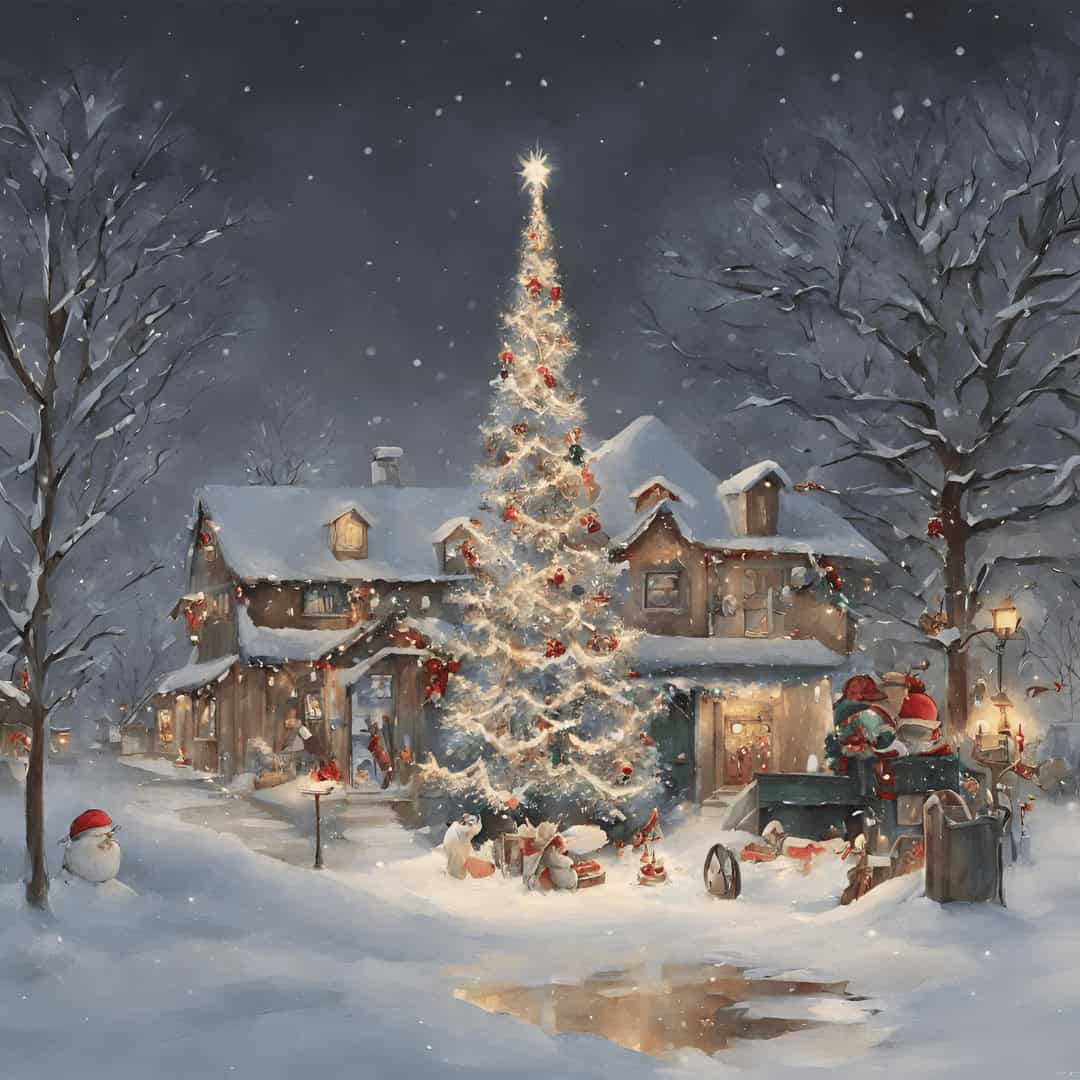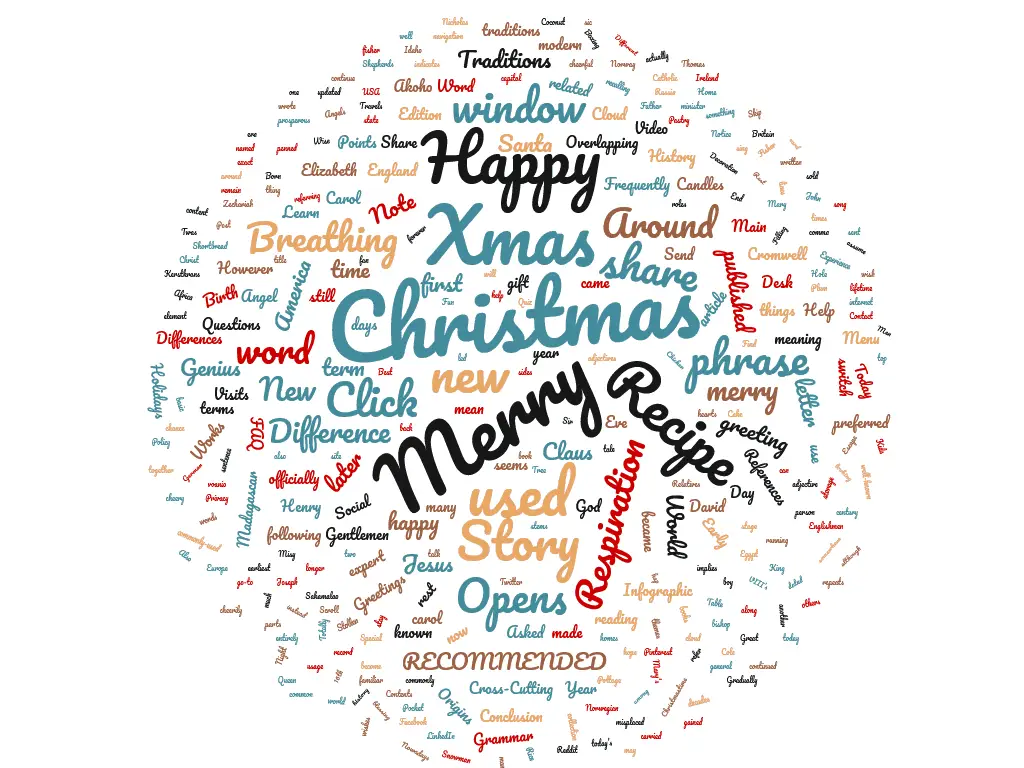The exact first usage of “Merry Christmas” is not entirely known, but we can assume it is somewhere around the 16th century.
Around this time in history, the word “merry” was much more commonly-used than it is in modern times.
“Merry Christmas” is the go-to greeting in America during Christmastime. In parts of Europe, such as Great Britain and Ireland, it is “Happy Christmas”.
However, the more general term of “Happy Holidays” may be used on both sides of the world.
“Merry Christmas” in Early Works
In a letter dated 1534, a man named John Fisher wrote to Thomas Cromwell well wishes and used the phrase “Merry Christmas [sic]” in his blessing.
fisher was a Catholic bishop, and Cromwell was King Henry VIII’s minister, among other roles. The letter between these two Englishmen is the earliest known record of these words together.
Around this time, the well-known carol “God Rest You Merry, Gentlemen” was also penned in England, and officially published later, in 1760. Notice that the comma seems misplaced in this title, but actually is not.
In those days, “rest” could mean something along the lines of “continue to remain”, and “merry” would refer to being prosperous (instead of today’s meaning of “cheery”).
Nowadays, this has been updated to its new meaning, as we sing “God rest you (or “ye”), Merry Gentlemen”.
In 1823, ‘Twas the Night Before Christmas was written with the ending of “Happy Christmas to all, and to all a goodnight”.
The original phrase remained for 20 years or so, but now many versions have made the switch to “Merry Christmas”.
This change came after a series of related events from that era.
The phrase “Merry Christmas” was capitalized and used as a proper greeting in Charles Dickens’ famous tale “A Christmas Carol”, which was published in December of 1843 by London’s Chapman & Hall.
This book came about during a time when Christmas traditions throughout the country were being re-evaluated in a sense.
New traditions were being explored and reading (or later, watching) “A Christmas Carol” quickly became one. By Christmas Eve of that same year, the first edition had already sold out.
Also in 1843, Sir Henry Cole sent the first Christmas card. It carried the common holiday phrase that we still use today “A Merry Christmas and a Happy New Year”.
As the term “Merry Christmas” gained popularity over the following decades, another (now familiar) Christmas carol was published in 1935.
The song cheerily repeats “We wish you a Merry Christmas and a Happy New Year!”
Gradually, “Merry Christmas” became the preferred term in America, although the others are accepted.

Christmas Greetings Today
In America, the trend of using “Merry Christmas” over “Happy Christmas” has officially stuck to our vocabulary.
Although, in the more politically-correct modern days, many people have made a switch to “Happy Holidays”.
However, in England, “Happy Christmas” still tends to be preferred, as Queen Elizabeth II and her royal family have always continued to use it in their broadcasts.
A Grammar Note from the Desk of Santa Claus
Note that we only capitalize each word in the phrase if it is used as a greeting.
If “merry” or “happy” are used as basic adjectives in a sentence (such as in, “We had a very happy Christmas that year.”), the word should not be led by a capital letter.
The word “happy” stems from “hap”, which indicates an element of chance or hope. “Merry” is an adjective that implies a state of being cheerful.
While the word “merry” is no longer commonly used (other than when referring to Christmas and its themes), it seems that the phrase “Merry Christmas” will forever stay in our homes and hearts.
Learn More With the Help of Video
Main Points About Merry Christmas vs Happy Christmas
- Merry Christmas is frequently used by the American people while Happy Christmas is commonly used by the British.
- Happy describes inner emotional conditions too deep to demonstrate. While merry depicts an active behavior of boisterous gaiety, raucous.
- The use of Merry Christmas dates back to the Victorian era when the Methodist church members wanted to promote sobriety among the working-class people.
- Making merry was associated with alcohol and it was greatly frowned upon especially if associated with the birth of Jesus. To them, the phrase happy Christmas conveyed sobriety.
- Merry Christmas was further popularized by Charles Dickens’ A Christmas Carol. The carol ‘We wish you a Merry Christmas also further asserted the usage of the phrase.
Conclusion
Both Americans and British people use both merry and happy Christmas as a greeting but it seems “Happy” is more common in American English.
“Happy Christmas” became popular in a Christmas Carol, but Queen Elizabeth II continued to use the phrase “Merry Christmas” and this is probably why this is still the most common phrase in Britain and Ireland.
Word Cloud for Merry Christmas vs Happy Christmas
The following is a collection of the most used terms in this article on Merry Christmas vs Happy Christmas. This should help in recalling related terms as used in this article at a later stage for you.



